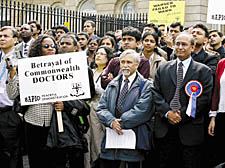|
|
 |
| |

Dr Ramesh Mehta joins the protest outside the department
of health |
Sick and tired of new visa
20,000 overseas doctors could be forced
to leave country under latest rules
LEADING physicians have accused the government of placing
nationality above merit following the introduction of stringent
visa restrictions on overseas doctors.
Some 20,000 junior doctors could be forced to leave the country
without completing their training under the new rules, according
to the British Association of Physicians of Indian Origin (BAPIO).
From July, medical graduates from overseas who want to work
or train in the NHS will need a work permit for the first time.
Hospitals will have to prove to the immigration department the
posts cannot be filled by a British or a country within the
European Union.
On Friday doctors and dentists marched down Whitehall in their
hundreds to protest against the Department of Health’s
decision.
BAPIO president, Dr Ramesh Mehta, said £5 billion worth
of medical training could go to waste if thousands of trainee
and unemployed overseas doctors are forced to leave.
“If the government has made a mistake they need to be able
to change this policy,” he said.
“It is a huge amount of money to waste. This is illogical
and unfair and a betrayal of dedicated doctors. Once doctors
are in this country they should be treated equally by the government.”
Protesters accused the Department of Health of ignoring the
NHS’s 50-year history of depending heavily on service by
overseas doctors and of failing to consult them.
There were speeches outside the Department of Health at Richmond
House before the march to Trafalgar Square.
Dr Rehman Khan, vice-chairman of BAPIO, said: “The British
government is wrong to do this on four counts; they are wrong
morally, ethically, economically and it will damage Britain’s
image.”
Health Minister Lord Warner has defended the decision saying
record numbers of student doctors had led to “increased
competition.” He said the department of health would “only
be recruiting doctors to the UK where we have a genuine skills
shortage.” |
| |
|
 |
|